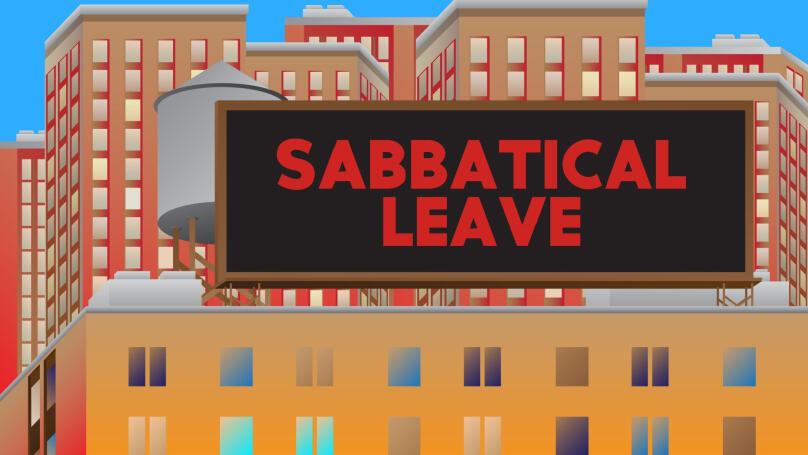A sabbatical – what it is and why you and businesses need them
We all know there are vacations and dismissals, and there are also maternity leaves, resignations, sick leaves, et cetera.

Nowadays breaks include a sabbatical - somewhat fairytale-like but very useful phenomenon, in my opinion, where an employee takes an extended leave from work but then returns to their previous position.
What is a sabbatical: a brief overview
Frankly speaking, there have been just a few of them in my company, and I have never considered a sabbatical, because my work is my life. However, sabbaticals are gaining popularity in the labour market and increasingly turn up here and there. The very concept ("sabbatical") comes from the Hebrew word "Sabbath" - in Judaism it is a sacred day of the week on which it is strictly forbidden to work and labour. The same is true during a sabbatical: in fact, the employee "temporarily resigns" in order to devote time to a new professional area, a hobby, travelling or any other way of replenishing their enthusiasm. At the same time, the company retains the employee's position and sometimes even pays a full or partial salary (this is very rare, in my experience, but it happens among large corporations).
The practice of sabbaticals first emerged in education, namely in the academic setting: back in the 19th century, Harvard researchers ware allowed to take such a leave once in seven years to get new research ideas or to focus on gaining new knowledge. Over time, this practice spread to business - McDonald's was the first company to offer sabbaticals, this happened in late 20th century.
A sabbatical's distinctive feature is its duration: it usually lasts from three months to a year, sometimes less, sometimes more. Everything is on a case-by-case basis. Sabbaticals are now most common in areas where it is easy for an employee to leave and return, namely in IT. For example, Google, eBay, Intel and IBM are famous for them.
Why you and your employees need a sabbatical (And do they?)

If you're an employee, you may have wondered: why do I need three whole months of holiday or more? Congratulations, if the question has indeed occurred to you! Chances are you don't need a sabbatical, you're doing just fine as it is. Here's what sabbaticals can do for others:
-
Give you time to get over burnout (or even prevent it). According to the statistics, 1 in 3 employees have suffered emotional burnout symptoms at least once in their lives. Frankly speaking, even I experienced it once! Its symptoms include apathy, insomnia, increased irritability, chronic anxiety and decreased working efficiency (usually a consequence of all the above). Emotional burnout is often the result of overwork and work addiction, and sometimes it is just a coincidence. Anyway, a sabbatical allows to take your mind off the tiresome work, to change the environment and the kind of activity, to begin to pine for your previous place and to return with your strength regained. In addition, during this time the employee can see a mental health professional - in such cases sabbaticals can be called health-improving into the bargain!
-
Change the kind of activity. Surely you occasionally want to try something new. Sabbaticals are a great opportunity to do it. Say, leave the accounting department for a month and work in a cake shop or a car wash.
-
Get some training. During sabbaticals you can also take training courses such as Lectera (although with us you can study and do your main job on a parallel track), learn new skills and develop additional competences that will be useful when you return to work.
-
Fulfill a long-held idea or a dream. When we work, we sometimes don't have enough time for personal projects, whether it's a renovation, a long-awaited trip or turning a hobby into a business. So during a sabbatical, all of these can be handled without distraction, and you can finally tackle the things you've been putting off for later.
-
Solve personal problems. Life occasionally unfolds in an unpredictable way... You have to juggle a whole host of family, work, romantic, health issues, etc. When these problems become too many and nothing goes right, it pays to stop and tackle them one by one. That's where sabbaticals come in handy.
In practice, sabbaticals don't have to have a clear goal, of course. Sometimes people take one just because they want to, and although I am dubious about the practice, but it has the right to exist. For individuals, the benefits and opportunities are undeniable, but things are not so obvious for businesses. There are only two main advantages for an employer to grant an employee a sabbatical. But then, what are they?
-
When the employee returns from a sabbatical, you will get a rested and motivated professional. Their skills and experience will remain the same, their resources will be regained, the sparkle in their eyes will be back and they will be full of overflowing creativity. You will get pretty much a new employee at the old price and "assembly". As a serial entrepreneur, I would certainly choose this option over saying permanent goodbye to a cool specialist or settling for their minimal selves when they suffer from exhaustion and burnout.
-
By offering sabbaticals, you'll boost your company's image in the marketplace and strengthen the relationships with the entire team. It's nice to know that the company cares about you, isn't it? This is a plus not only to your karma, but also to your reputation among your competitors.
I'll particularly mention that sabbaticals offer an opportunity not to say goodbye to a cool expert. This is a very important criterion for taking or granting a sabbatical! The person must be valuable to the company to such an extent that the employer is willing to go to such lengths for them and to reserve the job for them. If you are an ordinary employee, a newcomer to the company, you don't boast of any unique skills and knowledge, your employer is unlikely to agree to such an arrangement. Why would they wait for you instead of finding someone else?
How to go on a sabbatical the right way

All holidays are worth planning and such a long and significant one even more so. You've probably noticed that the more free time we have, the more wretchedly we spend it. That's why before you decide to go on a sabbatical, you should:
-
Analyse the situation and assess the risks. Are you sure you are ready to leave your job for such a long time? Will you let down your team, department or project? Maybe now is not the best time to do this? If the company is going through a crisis and you leave, there may be no place to come back to. Also, how do you assess your value that I mentioned? Do you adequately demonstrate it to the company to ask for a sabbatical, or do you need to go on improving your image and achievements?
-
Discuss the situation and options with the management. Be honest and open: tell them why you want to take a sabbatical, when you plan to return, how you are going to spend it. Offer your options and listen to what terms your superiors are willing to offer you. Seek compromises, but keep your best interests in mind. If your boss offers you just a two weeks holiday and you need two months, it is not a good idea to accept. Look at your situation and needs rationally, but do not overreact either- the company is unlikely to agree to a year with an "employee in reserve".
-
If possible, "mothball" work processes. Or find someone to delegate them to, train your colleagues and team on how to do your job while you are away. Complete all your projects and tasks to the best of your ability so you can relax with peace of mind.
-
Research other people's experiences and outside sources. Ask around to see if anyone has done sabbaticals or something similar, how they got back to work, how they planned and finally decided to do it. Read articles (there are plenty of them on the internet) or even specialised literature. I recommend a guide from Ben Reeve - he is a recognised master in sabbaticals.
-
Prepare a financial cushion. Your company is unlikely to agree to pay you for a sabbatical unless you work for Google. Make sure you have something to live on, and to this end:
-
review your expenses and your monthly total, then multiply it by the number of months you plan to spend on a sabbatical;
-
take into account unexpected expenses, such as a visit to the dentist, repairing a pipe (what if it bursts?), theft (God forbid, but still) and so on;
-
add another 15% of the resulting amount, just in case;
-
ideally, prepare a passive income source, at least for a while. This can be a leasing fee, advertising on your blog (if you run one), selling old things on appropriate sites, etc.
-
Make to-do and wish lists for your sabbatical. Simply put, plan what you will do. If it's travelling, plan for the same expenses, tickets, accommodation and destinations. Or make a skills list if you want to dedicate your sabbatical to learning. It can also be a regular list of leisure activities like "Go to the cinema" or "Eat ice cream". The main thing is to fill the sabbatical with things that will restore your resources (find such "healing" activities in advance), so that in the long run it does not end up with the usual lying on the couch and even deeper apathy.
-
Think about what will happen after the sabbatical. When will you come back? How exactly? What will happen to your career? What new goals will you set for yourself? You should have a clear understanding of not only where you are going to, but also where you will be when you return. You can do this during the sabbatical, of course, but keep in mind right from the start that it won't last forever.
Lectera’s Online Courses by topic
How should a business prepare for a sabbatical? In fact, there is only one way: ask the employee to inform you in advance about their temporary departure, if it suddenly becomes necessary. Before the employee leaves, find a replacement for them, or evenly distribute their tasks among the remaining ones. In general, the action plan is the same as if the employee is just going to quit. There is just one exception - you should keep their return in mind, this means being ready to give the employee their former job. After all, this is just a sabbatical, not a full-scale voluntary resignation, although the employee might decide not to return. However, you have to deliver on your part of the arrangement.
So, the sabbatical is a great practice, in my opinion. It is beneficial for both parties to the employment contract, and quite consistent with the 21st century, whose main curse is burnout, stress and constant rush. In addition, there was a huge surge in layoffs during the Covid-19 pandemic: for an employer, sabbaticals are better than staff turnover, especially if the people you risk losing are very valuable to you. The main thing is not to abuse either your privileges or your resources - you should know when enough is enough in everything, including leisure.
Share this with your friends via:
Latest News

A significant stage in the development of the alternative education system has begun in West Northamptonshire in the UK: the County Council is actively calling on parents, guardians, and trustees to participate in shaping the future of this key area.

Outwoods Primary School in Atherstone, Warwickshire, having experienced deep sadness after the loss of their famous cat, Silla, has found solace in a new pet – a Maine Coon named Aloysius O’Hara.

In modern universities, artificial intelligence, and in particular ChatGPT, is rapidly transforming from a controversial tool into a full-fledged student assistant.

An innovative educational project is gaining momentum in UK primary schools, aiming to change attitudes towards video games.

The Massachusetts Institute of Technology (MIT) presents MIT Learn – a revolutionary online platform that opens a “new front door” to access university knowledge and resources.












 Freelancing, Remote Work, Office Jobs, or Consulting: How to Choose the Work Format That’s Right for You
Freelancing, Remote Work, Office Jobs, or Consulting: How to Choose the Work Format That’s Right for You
 Test: How Prone Are You to Abusive Behavior as a Manager?
Test: How Prone Are You to Abusive Behavior as a Manager?
 The Psychology of Decision-Making: 7 Traps Leaders Are Most Likely to Fall Into
The Psychology of Decision-Making: 7 Traps Leaders Are Most Likely to Fall Into
 Test. What superpower would you possess if you were a superhero?
Test. What superpower would you possess if you were a superhero?
 Test. What Should You Let Go of Before Winter Ends?
Test. What Should You Let Go of Before Winter Ends?
 Test. Which Ritual Should You Start Practicing This Winter?
Test. Which Ritual Should You Start Practicing This Winter?

